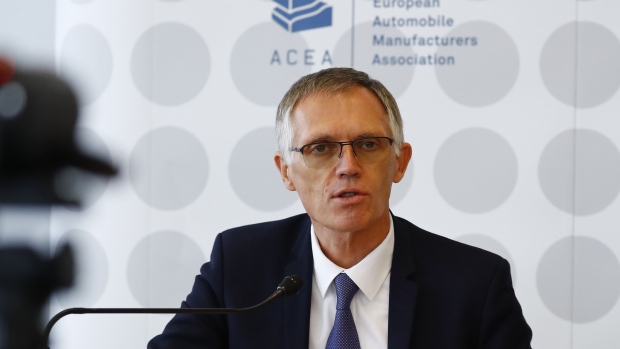Jul 14, 2022
Europe’s Auto Lobby Exits Reflect Fault Lines in EV Transition
, Bloomberg News

(Bloomberg) --
The auto business isn’t usually as dramatic in Europe, as long as Elon Musk isn’t dropping by. But the last few weeks have played out like a soap opera for the decades-old group charged with lobbying Brussels on behalf of the industry.
Two carmakers have announced plans in the past month to leave the European Automobile Manufacturers’ Association, or ACEA, by year-end. The departures suggest the sector is fracturing over the transition to electric vehicles.
Stellantis was first to bow out, issuing a statement that didn’t speak to what precipitated its decision. Sweden’s Volvo Cars was clearer last week, saying it’s withdrawing because it believes ACEA’s efforts to combat climate change aren’t aggressive enough.
Tensions seem to have been brewing for some time. Politico reported a year ago that Volkswagen, Europe’s biggest carmaker, was ticking off other manufacturers just as the ACEA needed to form a unified front in dealing with European Union legislation that sought to effectively ban the sale of combustion cars by 2035.
Maintaining harmony is no easy feat for an industry dealing with unprecedented complexity. Weaning the supply base off engines and onto batteries, building charging infrastructure and hoping EV prices drop fast enough to avoid demand destruction and massive job losses will be a high-wire juggling act.
It doesn’t help that Europe’s carmakers long embraced and advocated for diesel powertrains as a means to reduce the amount of CO2 coming out of tailpipes. When it surfaced VW and other manufacturers had flouted emissions tests to conceal just how dirty diesel actually was, the scandal did major damage to the industry’s standing with regulators and policymakers.
Meanwhile Tesla, long laughed off as a shoddy auto assembler on shaky financial footing, proved a mass market exists for stylishly designed, high-performance EVs. Rather than plead with governments to support installation of public plugs, the company went out and built an extensive network of superchargers for itself.
Yes, Europe’s automakers are all going electric now, but they’re doing so at different speeds.
Perhaps out of necessity after dieselgate, VW was among the first to announce its electric push. Volvo Cars is looking to produce only EVs by 2030.
Stellantis isn’t exactly dragging its feet — several of its models are among Europe’s most popular EVs — but executives have at times been critical of how quickly lawmakers want the industry to go all-electric.
For ACEA, speaking with one voice is an almost impossible task. Volvo Cars and Stellantis left for what at least look like diametrically opposed reasons, even if the chief executive of the latter company is reluctant to say so.
“There is nothing negative against ACEA,” Stellantis CEO Carlos Tavares said last month during a factory tour in France. “We are just refocusing our energy and our time on something we believe is more important, and that's the freedom of mobility.”
So what does this all mean for ACEA? The group set up in 1991 represents 16 members (at least for now) ranging from heavyweights VW, Toyota and Ford, as well as smaller manufacturers like Jaguar Land Rover and Ferrari. Pure-play EV companies including Tesla, Rivian and China’s Nio are notably absent.
The latter recently joined Tesla and Rivian in another EU lobby group, called the European Association for Electromobility, or AVERE, as Berlin-based auto analyst Matthias Schmidt pointed out on Twitter.
With the transition to EVs is in full swing, more upheaval among industry lobbies looks likely.
©2022 Bloomberg L.P.





